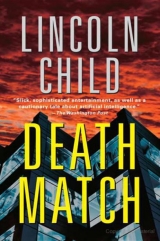
Текст книги "Death Match"
Автор книги: Lincoln Child
Соавторы: Lincoln Child
Жанр:
Триллеры
сообщить о нарушении
Текущая страница: 11 (всего у книги 26 страниц)
TWENTY-TWO
Four names,” Mauchly said.
He was staring at the table in Lash’s office. The two sheets of paper Silver provided lay on it, unfolded.
“Any idea why Liza flagged these four in particular?” Tara asked from across the table.
Mauchly picked up the sheet on which a single name had been printed. “Gary Handerling. Doesn’t ring a bell.”
“He’s part of the scrub crew,” Tara said.
“The what?” said Lash.
“Data scrub. They’re in charge of data storage and security.”
Mauchly glanced at her. “You’ve started the internal trace on him?”
“It should be completed within twelve hours.”
“Highest degree of confidentiality?”
“Of course.”
“Then I’d better get started on the three clients.” Mauchly picked up the other sheet. “I’ll have Rumson in Selective Gathering do complete workups.”
“What’ll you tell him?” Tara asked.
“That we’re running some random prototyping on a few obsoletes. Just another system test.”
Obsoletes, Lash thought to himself. Eden-speak for disqualified candidates. Guess that makes me an obsolete, too.
“Dr. Lash, we should have the results back by midmorning tomorrow. We’ll meet then, run them by your profile.” Mauchly checked his watch. “It’s almost five. Why don’t you two head home. We’ve got a long day tomorrow. Tara, if you wouldn’t mind taking Dr. Lash through the checkpoint, make sure he doesn’t get lost on the way out?”
* * *
By the time they pushed through the revolving doors onto the street, it was quarter past five. Lash stopped at the fountain to button his coat. The clamor of Manhattan, almost forgotten in the hushed spaces of the Eden tower, reasserted itself with a vengeance.
“I don’t see how anyone could get used to that,” Lash said. “Going through those checkpoints, I mean.”
“You can get used to anything,” Tara replied, slinging a satchel over one shoulder. “See you tomorrow.”
“Hold on a minute!” Lash trotted to keep up with her. “Where are you going?”
“Grand Central. I live in New Rochelle.”
“Really? I live in Westport. Let me drop you off.”
“That’s okay, thanks.”
“Then let me buy you a drink before you head home.”
Tara stopped and looked at him. “Why?”
“Why not? It’s a thing coworkers do sometimes. In civilized countries, I mean.”
Tara hesitated.
“Humor me.”
She nodded. “Okay. But let’s go to Sebastian’s. I don’t want to catch anything later than the 6:02.”
* * *
Sebastian’s was a sprawl of white-covered tables on the upper level of Grand Central, overlooking the main passenger terminal. The cavernous space had been completely restored in recent years, and was more beautiful than Lash ever remembered seeing it: creamy walls rising to a ceiling of groined vaults, green spandrels, and constellations of glittering mosaic. The voices of countless commuters, the squawk of the dispatch loudspeaker calling out arrivals and departures, mingled together in an oddly pleasing patchwork of background noise.
The two were shown to a small table perched directly in front of the railing. Within moments, a waiter bustled up. “What can I get you?” he asked.
“I’ll have a Bombay martini, very dry, with a twist,” Tara said.
“A vodka Gibson, please.” Lash watched the waiter thread his way back through the tables, then turned to Tara. “Thanks.”
“For what?”
“For not ordering one of those horrible martinis du jour. Somebody I was dining with the other week ordered an apple martini. Apple. What an abomination.”
Tara shrugged. “I don’t know.”
Lash looked over the railing at the streams of commuters. Tara was silent, twisting a cocktail napkin between the fingers of one hand. He looked back at her. Hazy light slanted down, catching the gentle curve of her auburn hair. Her eyes, framed by perfect high cheekbones, looked serious.
“Want to tell me what’s up?” he asked.
“Up with what?”
“With you.”
She wrapped the napkin around one finger, twisted it tight. “I agreed to a drink, not a psychiatric session.”
“I’m not a psychiatrist. Just a guy trying to get a job done, with your help. Only you don’t seem too eager to help.”
She glanced up at him for a minute, then returned her attention to the napkin.
“You seem preoccupied. Disinterested. That doesn’t bode well for our working relationship.”
“Our temporary working relationship.”
“Exactly. And the better we work together, the more temporary it will be.”
She dropped the napkin on the table. “You’re wrong. I’m notdisinterested. It’s been – a rough couple of days for me.”
“Then why don’t you tell me about it?”
Tara sighed, her gaze wandering toward the soaring vault overhead.
“I’m buying. It’s the least you can do.”
Their drinks arrived, and they sipped a moment in silence.
“Okay,” Tara said. “No reason you shouldn’t know, I guess.” She took another sip. “I didn’t learn about any of this until yesterday, when Mauchly called to tell me I’d be your liaison while you were inside the Wall. That’s when he told me about the problem.”
Lash remained silent, listening.
“The only thing is, just this Saturday, I got the nod from Eden.”
“The nod?”
“That’s what we call getting notification your match has been found.”
“Your match? You mean that you…” He stopped.
“Yeah. I’d been a candidate.”
Lash stared at her. “I thought Eden employees weren’t allowed to be candidates.”
“That’s always been the policy. But a few months ago they started a pilot program to phase in employee applicants, based on merit and seniority. In a pool with other Eden employees, not the general pool.”
Lash sipped his drink. “I’m not sure I see why the policy was needed in the first place.”
“The staff shrinks recommended it from day one. They called it the ‘Oz effect.’”
“As in, pay no attention to the man behind the curtain?”
“Exactly. They thought employees wouldn’t make desirable candidates. See, we know too much of what goes on, howthings go on, behind the scenes. They thought we’d be cynical.” Then she leaned toward him suddenly, an intensity in her face he hadn’t seen before. “But you have no idea what it’s like, day after day. Bringing people together. Sitting in the dark behind one-way glass, watching couples at class reunions talk about how wonderful everything had become. How Eden changed their lives, completedtheir lives. I mean, if you’ve already got someone and you’re happy, maybe you can rationalize. But if you don’t…” She let the sentence hang in the air, unfinished.
“You’re right,” Lash said. “I don’t have any idea what it’s like.”
“I carried that letter around with me all weekend. I must have read it a hundred times. Matt Bolan, in our biochemistry section, was the match. I’ve never met him, but I’d heard the name. They’d made a dinner reservation for us this coming Friday. One If By Land, Two If By Sea.”
“In the Village. Beautiful place.”
“Especially this time of year.” For a moment, Tara’s expression brightened. Then it clouded again. “Then, first thing yesterday, I get the call from Mauchly. He tells me about the supercouples, the double suicides. Would I be kind enough to shepherd you around.”
“And?”
“And right before I meet you, I send an email to the Applications Committee withdrawing my name as a candidate.”
“What?”
Tara’s eyes blazed. “How was I supposed to go ahead, knowing what I know? And worse, what I don’tknow?”
“What are you saying? That the application process is flawed?”
“I don’t knowwhat I’m saying!” she cried. Frustration brought an edge to her voice. “Can’t you see? The process can’tbe flawed, I work with it every day, I seeit perform miracles over and over. But then, what happened to those two couples?”
As quickly as it came, the violent emotion dissipated. Tara sank back. “Anyway, how can I go forward now? If Eden is about anything, it’s about lifetime commitment to a relationship. Can I begin such a relationship with a secret I can never reveal?”
The question hung in the air. Tara lifted her drink.
“There you have it,” she said with a dry laugh. “I’ve had a lot on my mind. Happy now?”
“I feel anything but happy.”
“Just please don’t bring it up again. I’ll be fine.”
The waiter reappeared. “Another round?”
“Not for me,” Lash said. The cocktail might have been a mistake: tired as he was, he’d probably fall asleep at the wheel halfway home.
“Me neither,” Tara said. “I’ve got to catch my train.”
“Just the check, please,” Lash told the waiter.
Tara watched the man recede toward the bar, then looked back at Lash. “All right. Your turn. I heard you tell Dr. Silver that your orientation was cognitive behavioral.”
“That was your first time in the penthouse, too. You never told me what you thought of the place.”
“We’re talking about you now, not me.”
“As you wish.” The waiter returned with the check; Lash fumbled for his wallet, dropped a credit card onto the leather folder. “Cognitive behavioral, that’s correct.”
Tara waited until the waiter had scooped away the bill. “I must have dozed off during our psych orientations. What does that mean?”
“It means I don’t focus on unconscious conflicts, on whether somebody got enough hugs from his mother at age two. I focus on what a person’s thinking, what his ruleset is.”
“Ruleset?”
“Everybody lives by a set of internal rules, whether they know it or not. You understand enough of a person’s rules, you can understand, predict, their behavior.”
“Predict. I assume that’s what you did for the FBI.”
Lash finished off his drink. “Something like that.”
“And if this – this turns out to be the work of a killer, will you be able to predict what he’ll do next?”
“Hopefully. But the profile is extremely contradictory. Anyway, maybe that won’t be necessary. We’ll know tomorrow morning.” As he spoke, Lash became aware of the waiter standing at his elbow.
“Yes?” Lash said.
“I’m sorry, sir,” the waiter said. “But this card has been declined.”
“What? Run it again, please.”
“I already ran it twice, sir.”
“That’s impossible, I just sent in a check last week…” Lash opened his wallet. It was as he feared: he was only carrying one credit card. He sounded his pocket for cash and found two dollars. Half asleep and forgot to go to the damn ATM, he thought.
He replaced his wallet and looked sheepishly at Tara. “Would you mind picking this up?” he asked.
She looked at him.
“I’ll pay you back tomorrow.”
And then, suddenly, her blank expression dissolved into a grin. “Forget it,” she said, dropping a twenty on the table. “It’s worth it just to see that smug psychoanalyzing look wiped off your face.” And then she laughed: briefly, but loud enough to turn heads halfway to the entrance of Sebastian’s.
TWENTY-THREE
By the time Lash broached the Eden lobby Wednesday morning, threaded the complex network of security, and gained the sixteenth floor, it was almost nine-thirty. He walked down the pale violet corridor, bypassing his darkened office and heading directly to the cafeteria.
“A jumbo espresso, right?” asked Marguerite, the counter woman who seemed to know everyone’s needs before they did.
“Marguerite, your espresso is the best in the tri-state area. I was dreaming about it the whole drive in.”
“Sugar, the amount of caffeine you ingest, they could put a set of wheels on you and you’d drive yourself.”
Lash sipped, sipped again. The hot liquid warmed his tired limbs and accelerated his heart. He smiled at Marguerite, then made his way back down the corridor.
He’d been slow to rise, feeling a lethargy that had little to do with weariness. The desperate urgency of their search seemed, ironically, to have a retarding effect on him. All his former field experience told him this wasn’t the way to work the case. You didn’t sit in an office, poring over computer transcripts. Sure, they were helpful enough in classification and profiling. But when you were hunting a suspected killer who might be about to strike again, you pounded the pavement, hunted up leads, talked to family and eyewitnesses. Sitting in a skyscraper, far from bodies and murder sites, gathering data, seemed like lunacy.
Yet Eden’s unmatched ability to gather data was all they had.
Reaching his office, Lash saw through the door pane that one entire wall was now hidden behind stacks of evidence lockers. He barely had time to step inside and place his cup on the desk before Mauchly entered, Tara Stapleton at his side.
“Ah, there you are, Dr. Lash,” Mauchly said. “As you can see, the gathering process finished earlier than expected.”
Tara smiled at Lash. As she moved to the terminal and scanned her bracelet, Mauchly closed the door and lowered the blinds. “Let’s begin with the three obsoletes.”
“What if we don’t find our killer?”
“Then we’ll move on to the Eden employee, Handerling. Though that seems a remote possibility.”
“Whatever you say.” Lash was highly skilled at reading people, but Mauchly remained an enigma. His seemed a monochrome personality, unburdened by mood or even emotion.
“Let’s get started,” Tara said. For the first time, she had a brisk, eager air about her. The prospect that filled him with lassitude seemed to give her energy.
They took seats around the table. Lash sipped his coffee while Mauchly broke open the first of three summary folders, put the contents on the desk.
“Grant Atchison,” Mauchly said, reading from the top sheet. “Completed initial application July 21, 2003. Age twenty-three, male Caucasian, graduated Rutgers with a bachelor in economics, residing at 3143 Auburn Street, Perth Amboy, New Jersey.”
“Is that his own home, or his parents’?” Lash asked.
Tara had taken up a few of the sheets and was riffling through them. “Parents.”
“So far, so good.”
“Employed at a chemical dye plant in Linden.” Mauchly turned over a sheet. “Passed our initial screening, came in for applicant evaluation in August. Was rejected by the senior evaluator, Dr. Alicto.”
Lash waited for Mauchly to glance up at him. But the man’s eyes remained on the summary sheets.
“Reason?” Tara asked.
“A lot of false answers on the tests, for one thing. Validity scales were way off baseline.” Mauchly read from the sheet. “‘Difficulties with impulse control, emotional turbulence, anhedonia.’ It goes on.”
“He was in Arizona during the week the Thorpes died,” Tara said.
“How do you know that?” Lash asked.
“Any of half a dozen ways. Guy buys an e-ticket, gets entered into the airline database. Pays for it with a credit card, gets into the credit card database. Rents a car in Phoenix, gets into the car rental database.” She shrugged as if it was common knowledge.
“Yes, but here’s a problem.” Mauchly was looking at the last page of the summary. “There are reports here of a recent medical condition: bloods sent to Enzymatics for a workup, there’s traffic on the insurance carriers network.” He glanced at Tara. “Care to dig a little deeper?”
“Sure thing.” Tara walked over to the terminal behind Lash’s desk and began to type. “The guy was admitted to Middlesex County Hospital two and a half weeks ago. Renal problems. Had to remove a kidney.”
“Length of stay?”
More typing. “He’s still there. Complications from surgery.”
Lash listened to this interchange in growing disbelief.
“So much for Mr. Atchison.” Mauchly gathered the papers, returned them to the folder, then laid it aside and broke the seal on another. “The second obsolete’s name is Katherine Barrow. Completed application December 20, 2003. Age forty-six, female, Caucasian, high school equivalency degree, resides in York, Pennsylvania. Religion filled out as ‘druid.’ Owns a shop called Feminine Magic in Lancaster County. Apparently sells candles, incense, herbal remedies.”
“What does her evaluation say?” Tara asked as she returned to the table.
“Never made it that far. There was a security incident after filing the initial application. Lingered in the lobby, tried to approach several male applicants. There was an intervention, and she became disorderly.”
“Tut-tut,” said Tara.
Mauchly leafed through the summary. “Credit card vouchers and hotel records place her in Sedona, Arizona, when the Thorpes were killed. She was attending a seminar on crystals.” He put down the summary, looked at Lash. “How common are female serial killers?”
“More common than people think. Dorothea Puente killed as many as nine of the lodgers in her boarding house during the late eighties. Mary Ann Cotton left a trail of dead husbands and children behind her. Over ninety percent are white. They’re frequently health-care providers or other ‘black widows’ that have been quietly killing for decades. Age forty-six would fit the pattern. Does she have any family?”
Mauchly looked down at the gathered sheets. “No.”
“Look for signs of an isolated existence, no criminal record, possible abuse as a wife or harsh discipline as a child.”
“Never married,” Mauchly went on. “Runs the shop by herself – I see no reports of any employees in the Department of Labor database. No criminal record.”
Lash, watching, could only shake his head. He’d already seen – firsthand – the incredible volume of data Eden assembled on its clients. And yet this ability to peer so deeply into the life of somebody who’d been summarily rejected years before was unsettling.
“Looks like we might have strike two,” Tara announced. “There may be no criminal record, but there’s a medical history here of substance abuse. She’s been in and out of detox the last six months.” She picked up some additional sheets, returned to the computer. “Barrow checked herself into a rehab clinic outside of New Hope early Saturday morning.”
“The Wilners died Friday night,” Mauchly said. “York’s only a two-hour drive from Larchmont.”
Tara was typing again. “Upon admittance, she was found to have near-toxic levels of fentanyl in her system. The admitting clinician said she’d passed out in the guest lot of the clinic, been asleep for hours.”
“Nobody could commit two murders with a bloodstream full of fentanyl,” Lash said.
Tara sighed.
For a moment, nobody spoke. Then Mauchly put the papers aside and broke open the third and last folder.
“James Albert Groesch,” he began. “Age thirty-one, male Caucasian, no religious affiliation, dropped out of vocational college after two years. Resides in Massapequa, New York. Postal employee. Passed initial screening. Returned for applicant evaluation, failed by the senior evaluator.”
“Reason?” Lash asked.
“Alarming test results. The personality inventory showed defective socialization, ambivalence to close relationships, potential sexual maladjustment, incipient misogynic tendencies.”
“Misogyny? Why would such a person want what Eden has to offer?”
“You tell me, Dr. Lash. Not everybody comes to us with healthy reasons. That’s one of the things our evaluations screen out.” Mauchly scanned the report. “The evaluator states that, upon learning of being declined, Groesch grew threatening. He made angry statements about Eden, about – let’s see here—‘phony perfection,’ ‘artificial happiness.’ He implied it was all a government plot, recruiting women to spy on men, infiltrate their households. Security was called and the employee who’d vetted Groesch’s initial screening was disciplined.”
“Groesch was hiking in the Grand Canyon prior to the death of the Thorpes,” Tara said, examining the overview. “Spent two nights at Phantom Ranch. Flew from Flagstaff to Phoenix, then back to La Guardia, the day after their bodies were discovered.”
So all three had been in or around Flagstaff at the time of the deaths, Lash thought. No doubt one of the filters Liza had used in assembling the list.
“There’s something else,” Tara said. “Groesch’s evaluation took place on August 2, 2002.”
“And?” said Lash.
“That was also the day of Karen Wilner’s evaluation.”
A chill settled over the room.
“Defective socialization,” Lash murmured. “Sexual maladjustment.”
He turned toward Mauchly. “Anything else there? Anything that says this couldn’tbe our boy?”
Mauchly looked back at the overview. He scanned it briefly, then passed it to Tara. She turned over the pages, shook her head.
A brief but electric tingle surged through Lash. The weariness he’d felt was gone. There was a color photograph of Groesch lying among the papers, and he picked it up. A burly man with close-cropped blond hair and a huge handlebar moustache glared back at him.
“Let’s break out the picks and axes,” Tara said. “Time for some data mining.”
Wordlessly, Mauchly stood and walked toward the far wall, where the evidence lockers were stacked. He brought three to the table, unsealed the first. Inside, Lash saw credit card statements; telephone records; transcripts of what looked like Internet URLs.
“Tara, would you contact the CCTV group and coordinate?” Mauchly asked. “Have them start running recognition algorithms in Massapequa, Larchmont, Flagstaff. And see who’s satellite liaison today. Have them spin up their archives, just in case.”
“Sure thing.” Tara stood, picked up the telephone.
Mauchly reached into the open locker, pulled out two enormous stacks of papers, and began leafing through them. “It appears Mr. Groesch made numerous calls to his mother in the weeks leading up to the four deaths. We’ll have to pinpoint any calls he made on the two days in question – that could prove instructive. Hmm. He also joined several primitive Internet matchmaking services over the last couple of months. In each case, he seems to have filled out the forms differently, lying about his age, place of residence, interests. He also seems to have visited some rather unusual websites lately: a site that describes how to make poisons, another specializing in graphic photographs of murders and suicides.” He glanced up. “Does this fit with your profile, Dr. Lash?”
It was overwhelming, the level of detail Eden seemed able to pull effortlessly out of the air. “How are you able to do all this?” Lash asked.
Mauchly looked up at him again. “All what?”
“Assemble all this information. I mean, these people didn’t even become your clients.”
Mauchly’s lips thinned briefly in what might have been a smile. “Dr. Lash, bringing two people together in perfect unity is only half our business. The other half is, shall we say, informational awareness. Without the latter, we could never do the former.”
“I know. But I’ve never seen anything close to it, even at the Bureau. It’s almost as if you can reconstruct people’s entire lives.”
“People think their daily activities are invisible,” Tara said. “Not so. Every time you surf the Web, software cookies track where you’ve been, every click of your mouse while you were there. Every email you send goes through a dozen hosts before reaching its destination. Spend a day in any large city, and your image is captured by hundreds of closed-circuit television systems. All that’s lacking is an infrastructure robust enough to gather it all. That’s where we come in. We share our information with commercial database providers, selected government agencies, ISP vendors, junk-mail distributors, and—”
“Junk mail?” Lash said in surprise.
“Junk mail outfits have some of the most sophisticated data algorithms around. It isn’t the untargeted bulk people think. Same with telemarketers. Anyway, all this data on you is collected and stored. Stored forever. Our problem isn’t getting enough data: we usually gather too much.”
“It’s like Big Brother.”
“Perhaps it seems that way,” said Mauchly. “But with our help, hundreds of thousands of clients have found happiness. And now we might also stop a murderer.”
There was a knock on the door; Tara rose from the keyboard to open it. A man in a lab coat handed her an ivory-colored folder. Tara thanked him, closed the door, and opened the folder. She stared at the contents a minute.
“Shit,” she said under her breath.
“What is it?” Mauchly asked.
She handed him the folder wordlessly. Mauchly glanced at it a minute. Then he turned to Lash.
“Our team ran a facial recognition search through our archive of surveillance images,” he said. “We already knew Groesch was around Flagstaff when the Thorpes died, so Tara limited the search to his whereabouts the night of the Wilners’ deaths. The search picked up these images.”
He handed some photographs to Lash. “Here he is, at an ATM at 3:12 p.m. And here again, running a traffic light at 4:05. And again, buying cigarettes at a liquor store at 4:49. Again at 5:45, shopping for jeans.”
Lash looked at the photos. They were glossy eight-by-tens, similar to the SOC evidence photos he’d seen at the Bureau. The resolution was remarkably good, and there was no mistaking the blond man with the handlebar moustache for anybody but James Groesch.
He handed back the pictures with mounting excitement. “Go on.”
Mauchly pointed to a stamped label on the outside of the folder: MASSAPEQUA, INNER RING, 9/24/04.
As quickly as it had come, the excitement died away. “So he was in Massapequa while the Wilners bled out in Larchmont,” Lash said.
Mauchly nodded.
Lash heaved a sigh. He glanced at the clock: it was just ten-thirty.
“What now?” he asked.
But he already knew the answer. Now came their last potential suspect. Gary Handerling. Eden’s own.








